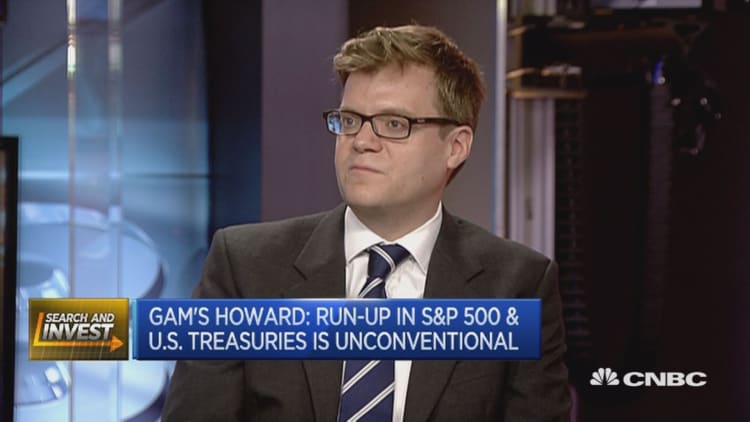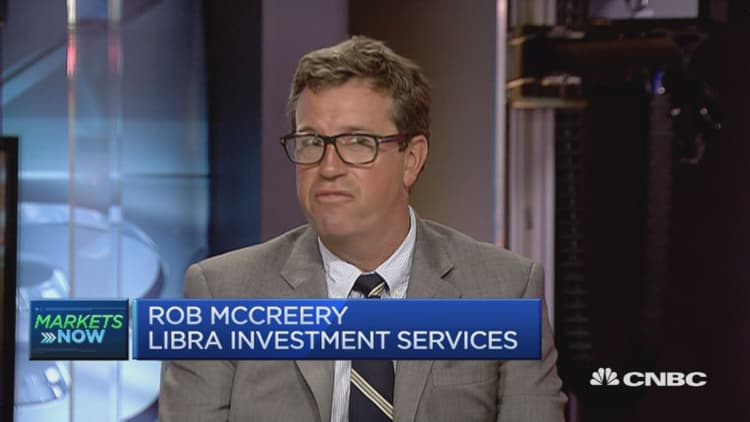


Investors need to think ahead about how to generate returns independently in case the rally in equities and bonds loses steam, one analyst has told CNBC.
"Rather than trying to work out whether central bank's going to drive the market higher or not, which I think is kind of a fool's game, we're much better off trying to seek value from independent sources of return," Julian Howard, investment director of Multi Asset Class Solutions at GAM, told CNBC on Tuesday
Howard said that any investors thinking of piling in to equity markets need to be "agnostic about market directionality." He believes that areas that are non-directional and are "relative value players within markets" could be extremely interesting.
"But (the key thing) is just getting away from riding this rally because the (Federal Reserve) is going to be off-live for an extended period of time," he said.
"There was this assumption that with low interest rates, people were looking for equity stocks that were basically going to give them an income but those stocks are looking really expensive now, so I think the rotation will be into cyclicals from this moment on, and we've seen that in the last few days with energy stocks coming back a bit," he said.
Investors round the world have sought returns in equity markets as central banks around the world sought to prop up economic growth with extensive quantitative easing programs, causing a flood of liquidity, and low interest rates. The record-breaking rally in equities has also been accompanied recently by a surge in government bonds, however, as investors have also sought a safe-haven for their money amid an uncertain global economic, financial and political outlook.
That piling into equities and bonds has prompted many market analysts to fear that these markets are over-valued, over-heating and are, ultimately, over-reliant on central bank policy.
Safety in numbers
A classic investment portfolio tends to contain a 60:40 stock-to-bond ratio but Howard said his team ran several investment strategies, one of which being a multi-asset fund of funds with around 20 percent equities, 65 percent bonds and alternatives and 15 percent cash.
Howard said that although there was some "pragmatic engagement" in equities: "We're not at zero, we're not outright short, but we feel that big chunk in bonds and alternatives is what's going to deliver the return hopefully regardless of what happens to the broader direction of treasuries and the S&P 500."
When GAM invested in bonds, Howard said, it was not in the "G-4 government bond complex" of U.S. Treasurys, U.K. gilts, German bunds and Japanese bonds but rather in a selection of alternatives including catastrophe bonds, mortgage-backed securities, liquid high yield and macro-bond managers.
"So it's all about seeking that alternative, steady and reliable source of return – maybe 3 or 4 percent, which is not amazing but I think timing and exit out of equities and bonds will be very difficult and I'd rather be making that 3 or 4 percent in the meantime," he said.
Game of risk
Meanwhile, Rob McCreery, founding partner and head of sales at Libra Investment Services, told CNBC Tuesday that equity investors were reluctant to miss out on the party despite the "game of risk" that stock markets posed as they continued higher.
"There was a time when you had to be buying the market, if you were a value investor you had no choice, you had no reason to be stepping outside. But now of course that's not the case, now it's a question of how long do I stay there? It's become a game of risk to a certain extent," he told CNBC Tuesday.
"At the moment, as far as we see things, while things aren't cheap, we're looking at the number of stocks in the EuroStoxx 600 index that traded at a discount to fair-value and they're diminishing by the day. You can't go out and find a bunch of things that look really cheap but by the same token you're not finding a lot of things that look very expensive either and if you're in the game of investing in equities, you've got to put your money somewhere at the moment," he said.
"If you're sitting outside and you thought this (rally) was never going to happen, if back in June and July you thought, 'This is never going to happen, I can't be invested in this,' well now what do you do? Now you're sitting there feeling forced to invest," he added.


